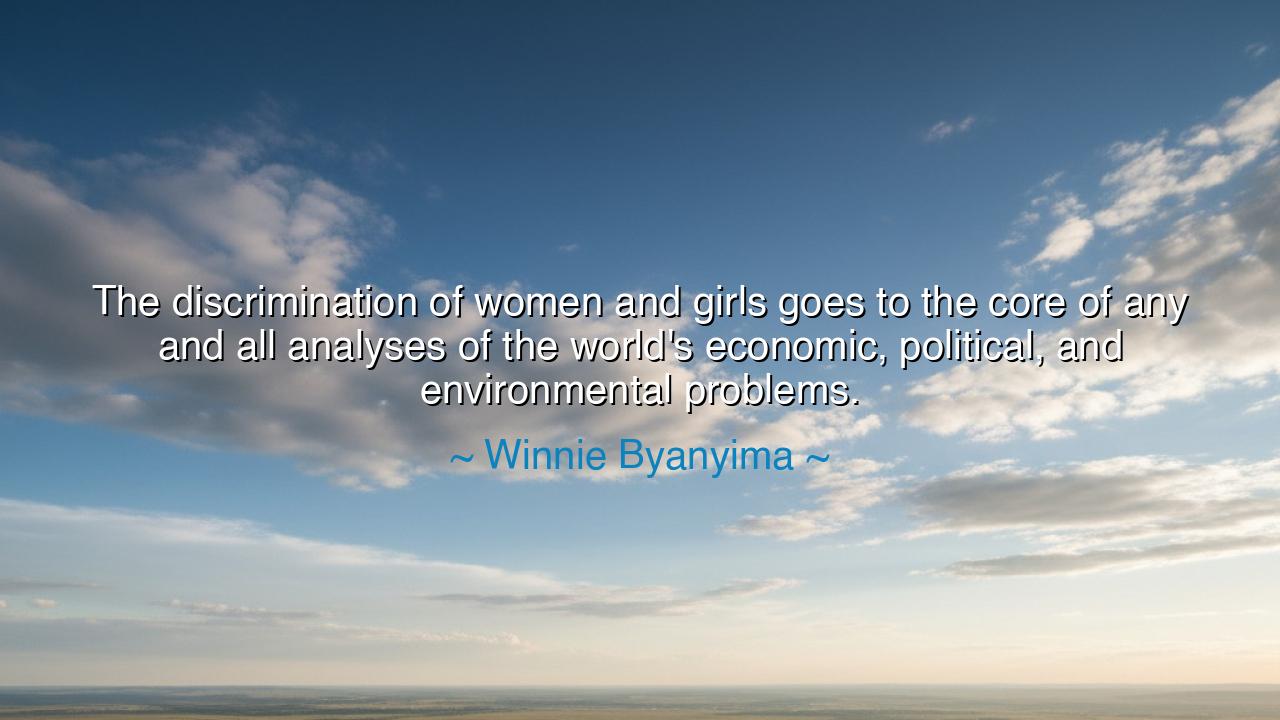
The discrimination of women and girls goes to the core of any and
The discrimination of women and girls goes to the core of any and all analyses of the world's economic, political, and environmental problems.






Hear the voice of Winnie Byanyima, a leader who has walked through the halls of power and yet has never forgotten the cries of the poor and the silenced, who declared: “The discrimination of women and girls goes to the core of any and all analyses of the world’s economic, political, and environmental problems.” These are not words spoken lightly, but the distilled wisdom of centuries of suffering and resilience. They remind us that the fate of humanity is bound to the dignity of women, and that no true progress can be built upon their exclusion.
The origin of this saying lies in Byanyima’s lifelong work as an advocate for justice and equality, from her service as a Ugandan politician to her leadership at Oxfam International and UNAIDS. She saw firsthand how poverty deepens when women are denied education, how politics grows corrupt when women are absent from decision-making, and how the earth suffers when women—who have long been its caretakers—are silenced in environmental struggles. Her declaration is thus both observation and warning: unless the chains of discrimination are broken, every other effort will falter.
History proves her right. Consider the story of Malala Yousafzai, who as a girl in Pakistan was forbidden by extremists from seeking education. A bullet was meant to silence her, yet her voice rose stronger, echoing across the world. Her story reveals a simple truth: when girls are denied learning, whole nations remain in ignorance; when women rise in knowledge, societies flourish. The economic problems of the world are not separate from the discrimination of women—they are its direct fruit.
We see the same in political history. When women were denied the vote in ancient and modern times, governments reflected only the ambitions of half their people. Decisions about war, peace, and justice were made without the voices of mothers, sisters, and daughters. The result was imbalance—systems built upon dominance rather than harmony. Only when suffrage movements fought and prevailed did nations begin to inch closer to the promise of democracy. Byanyima’s words declare this truth: the health of politics rests upon the full participation of women.
And in the realm of the environment, her teaching resounds again. Across Africa, Asia, and Latin America, it is women who fetch the water, till the soil, and gather firewood. They are the first to feel the sting of drought, the first to suffer when forests are stripped and rivers poisoned. Yet when solutions are debated, their voices are often the last to be heard. Excluding women from environmental decisions is not only unjust—it is foolish, for those closest to the earth’s wounds carry wisdom for its healing.
The lesson, O listener, is clear: the oppression of women and girls is not a side issue, but the root from which many of the world’s greatest struggles spring. Until equality is achieved, economic injustice will persist, political corruption will thrive, and environmental destruction will worsen. To fight for women’s rights is to fight for the liberation of all, for the lifting of half of humanity lifts the whole.
And what, then, shall we do in our daily lives? We must honor the dignity of women wherever we are: in homes, in workplaces, in schools, in governments. Support education for girls, for in their learning lies the future of nations. Demand representation for women in leadership, for without their voice, the world is broken. Listen to women when they speak of the land, the water, and the sky, for they have been its stewards for generations. Above all, teach our sons and daughters alike that equality is not charity—it is justice.
So remember the teaching of Winnie Byanyima: to ignore the plight of women is to blind oneself to the true causes of the world’s suffering. But to uplift them is to open the gates of prosperity, justice, and renewal. Let us walk this path with courage, that future generations may inherit not a broken world, but one made whole by the power of equality.






AAdministratorAdministrator
Welcome, honored guests. Please leave a comment, we will respond soon